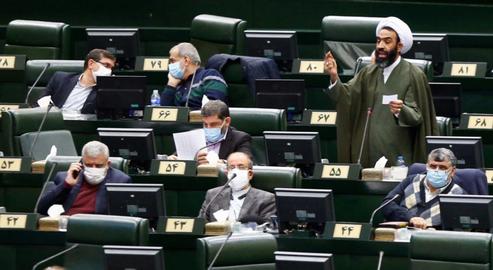Just two days before the Islamic Republic’s deadline to reduce inspections by the International Atomic Energy Agency (IAEA), and while the IAEA’s director Rafael Grossi was visiting Iran, the Iranian government reached a “temporary” agreement with the agency regarding its nuclear program.
Under this agreement, strict supervision by the agency on Iran’s nuclear activities remains in place – albeit in a modified form – while the Iranian parliament’s decision to stop complying with the IAEA’s Additional Protocol, which gives the agency substantially enhanced tools with which to carry out inspections, is symbolically observed.
***
According to this agreement, not only will the number of IAEA’s inspectors in Iran not be reduced but the agency’s surveillance cameras will remain active at Iranian nuclear installations for another three months, even though the agency won’t not have access to the recordings of these cameras unless American sanctions on the Islamic Republic are lifted. If and when this happens, Iran will both carry out the Additional Protocol and would deliver the recordings to the IAEA. Otherwise, recordings by the surveillance cameras will be erased after three months.
Following the agreement, the Atomic Energy Organization of Iran (AEOI) announced in a statement that the law passed by the parliament, called “Strategic Action to Lift Sanctions and Protect the Interests of the Iranian Nation”, that orders the government to stop compliance with the Additional Protocol will be implemented but the agreement with the IAEA that practically puts the law on hold has already created a storm of criticisms by the parliament.
In an action that has little precedent in the Islamic Republic, the parliament wrote a letter to the judiciary, calling the agreement with the IAEA “illegal”. Review of the budget bill was set aside and, with 221 votes, the parliament passed a resolution asking the judiciary to use its authority to declare the agreement null and void.
Stop Compliance or Else!
The “Strategic Action” law stipulates that government officials who do not comply with the law will be punished with prison sentences and expulsion from government service. The parliament and the Guardian Council passed the law on December 2, 2020, after the victory of Joe Biden in the US presidential election. The law ordered the government to stop complying with the Additional Protocol by February 23.
The Additional Protocol allows the IAEA’s inspectors to carry out inspections in Iran on an ongoing basis. Inspectors can attend Iran's nuclear facilities with immediate effect and without informing the government. In addition, if they suspect uranium production or nuclear activities are taking place at a non-nuclear facility, they can demand the Iranian government allow environmental samples to be taken the site to determine the presence or absence of nuclear activity.
It was through these inspections that recently the IAEA announced traces of uranium had been found in two non-nuclear sites in Iran, suggesting that Iran could have been conducting nuclear activities that had been concealed from the IAEA.
Complying with the Additional Protocol was part of the agreement officially known as the Joint Comprehensive Plan of Action (JCPOA) and the law passed by the parliament was meant to force the United States to lift nuclear sanctions by February 23.
Earlier Foreign Minister Mohammad Javad Zarif had said that, in a meeting with him, President Rouhani and Ali Akbar Salehi, head of the Atomic Energy Organization of Iran, Ayatollah Khamenei had told them that the law passed by the parliament “must be carried out” but the Iranian government knows well that stopping wide-ranging inspections by the IAEA would mean that the international pressure on the Islamic Republic would be intensified.
Considering that Iran has resumed enriching uranium at 20 percent, terminating inspections by the IAEA can quickly lead to an international consensus against Islamic Republic’s nuclear program. It likely that the temporary agreement with the IAEA is meant to bypass the law passed by the parliament.
There can be no doubt that such an agreement could not have come about without Ayatollah Khamenei’s approval but, as usual, the Supreme Leader is not going to take any responsibility for it and it is Rouhani’s administration that must pay the full price for criticisms by the parliament and by Khamenei’s supporters.
By supporting “Strategic Action to Lift Sanctions and Protect the interests of Iranian Nation”, Ayatollah Khamenei wanted to pressure the United States to lift sanctions but only succeeded in plunging Iran into another difficult situation. On the one hand, parliament is accusing Rouhani’s administration of bypassing the law and, on the other hand and with the consent of Khamenei, the government has practically suspended compliance with the Additional Protocol, which means having to deal with increased internal pressure. Meanwhile, the parliament has kicked the ball into the judiciary’s court and wants it to declare the agreement with the IAEA null and illegal.
It is very unlikely that this imbroglio could have come about without orders from the person of Ayatollah Khamenei to the parties involved. It shows that all three branches of government obey his decisions and high price of his nuclear policy must be paid not only by Iranian citizen but also by his own regime.
Related coverage:
What Will Happen if Iran Expels Nuclear Inspectors?
EU Warns Iran Over Uranium Enrichment
What are the Consequences of Iran’s Higher Rate of Uranium Enrichment?
visit the accountability section
In this section of Iran Wire, you can contact the officials and launch your campaign for various problems


























comments